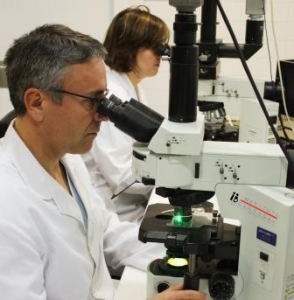
Comprehensive Chromosomal Screening (PGS/PGT-A/CCS): More reliable and less damaging for embryos
The necessary information for an adequate development of human beings is contained in some “books” called genes; they are written in an “ink” called DNA. Our total number of genes is found in the 46 chromosomes that we inherit from our parents, and it should have no excesses or deficiencies, since these could cause serious diseases and malformations, and even put our life in danger.
Human embryos have a high rate of chromosomal alterations, especially in the case of couples with fertility problems, such as recurrent miscarriages and implantation failures. For this reason, when we are in the In Vitro Fertilisation (IVF) laboratory with a couple’s embryos, we already know it is very likely that many of them are chromosomally abnormal.
Only embryos with no excesses or deficiencies in their DNA have the capacity to produce a healthy newborn. Therefore, by identifying and selecting an embryo with a full chromosome count, we manage to guarantee that the embryo has maximum capacity to produce a healthy child.
For years, great efforts have been made in the field of Genetics and Molecular Biology to develop techniques that enabled detection of changes in DNA amount. With the techniques that were used, such as FISH (Fluorescence In Situ Hybridisation), we could not find out the actual number of chromosomes in an embryo. These techniques enabled us to see only certain chromosomes (X, Y, 13, 15, 17, 16, 18, 21 and 22) and only certain chromosomal regions. In other words, we could only see the tip of the iceberg and remained ignorant of the rest of the ice mass.
Fortunately, things are different these days. We have a technique whereby we can analyse the full chromosome count of embryos: array-CGH and the Next Generation Sequence (NGS). This technique enables chromosomal gains and losses to be detected in embryos. Today we can finally talk about a Comprehensive Chromosome Screening (PGS/PGT-A/CCS). In this way, we can analyse the full chromosome count of embryos while remaining certain that no excesses or deficiencies in DNA preventing adequate development exist. CCS is a reliable and very promising technique whereby we can identify those embryos that are chromosomally normal and have the highest capacity to produce a healthy child.
The best time for embryo analysis is around day 5. Embryos are more developed, a higher number of cells can be collected for analysis and, therefore, diagnostic power is enhanced. Furthermore, the sample for analysis is collected from the embryo’s outer layer, which will produce the placenta, preserving those cells that will create the embryo itself without altering their capacity to implant.
Taking all of the above into account, we can say that PGS/PGT-A/CCSby array-CGH or NGS and the biopsy on day 5 of embryo development has become the most reliable, safest and most advanced technique to find out about the chromosomal health of embryos.

Now, what are the results achieved with PGS/PGT-A/CCS?
Two major breakthroughs:
First, selecting those embryos that are chromosomally normal and therefore have the best chances to implant. Secondly, a dramatic decrease in miscarriage rates.
For these reasons, PGS/PGT-A/CCS is specially indicated for patients who have failed to achieve pregnancy after several IVF treatments with no known causes and patients who have suffered recurrent miscarriages or implantation failures. Recent studies published in the most prestigious fertility journals suggest that CCS could increase birth rates to up to 70% and reduce miscarriage rates to below 5%.
The Implantation Failure and Recurrent Miscarriage Unit at Instituto Bernabéu pioneers the implementation of these innovative techniques to increase the effectiveness of IVF, reduce the risk of suffering further miscarriages to its bare minimum and, thus, achieve our common goal: carrying a healthy baby home.
Dr. Belén Lledó, IBBIOTECH scientific Director of Instituto Bernabeu.
